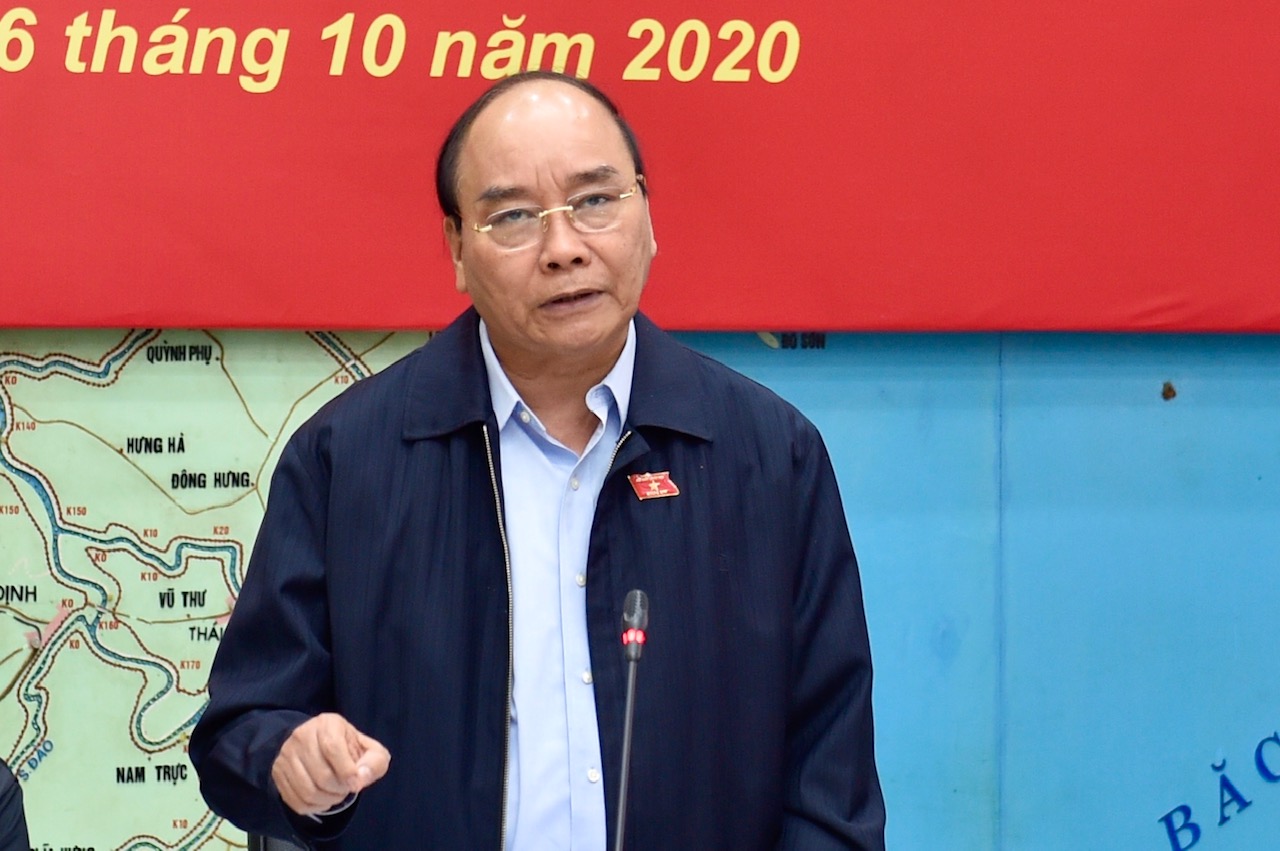The Prime Minister emphasized that we are in the situation of "storms onstorms, floods on floods", especially in the central region, we need to implement all possible solutions to save lives and people.

Prime Minister Nguyen Xuan Phuc: Saving people is the most important thing - Photo: VGP / Nhat Bac
This morning, October 26, at the headquarters of the Ministry of Agriculture and Rural Development, Prime Minister Nguyen Xuan Phuc chaired an online meeting to direct storm response. Attending the meeting were Deputy Prime Minister Trinh Dinh Dung, Minister of Agriculture and Rural Development Nguyen Xuan Cuong, leaders of several ministries, branches and localities at online bridges. After listening to the opinions and conclusions of the meeting, the Prime Minister emphasized that we are in a situation of "storms, floods and storms", especially in the Central region. The Prime Minister asked localities to seriously deploy electricity to respond to typhoons No. 9 (the international name Molave with the strongest wind in the area near the center of the 12 strong storm, or 115-135 km / h, shock level 14). The Central Steering Committee for Natural Disaster Prevention and Control and related agencies must urge the inspection and ensure the best implementation of this electricity. "We must not let our guard down", the Prime Minister stated that the best proactive spirit to prevent damage caused by strong storms and floods after storms.
Rescue and support for people in 5 central provinces continued to be deployed, especially searching for missing people, supporting people to stabilize their lives. The Prime Minister, Deputy Prime Ministers, and agencies have had a policy, "You guys stick to these guidelines, do not let the people fall into the situation of" the sun shines on the earth ", starvation and difficulties.
For typhoon No. 9, which is expected to land in our country on October 28, the Prime Minister pointed out that the safety of people, both on board and on rafts, must be ensured. “Saving people is the most important thing, so all the possible solutions, calling for ships, relocating people as well as when the ship is in, be determined to bring fishermen ashore, fishermen on cages have to go up shore, ”said the Prime Minister. This is the experience when in the past, when I stayed close to the shore, there were still unsafe incidents, “because of lobsters and fish cages, the owner kept the fishermen, did not allow them to go ashore must be dealt with strictly ”.
Therefore, ships and boats have to come ashore early, anchored to avoid impact. Prime Minister recalled the case in 1986 in Da Nang, "the ship was in, anchored on the shore, all was smashed, causing death". Along with that, proactively evacuate people in lowland and coastal areas because there is a perception that the coastal area has big waves. All localities must have appropriate plans to relocate people, not to affect the lives of coastal people. Along with that, storms can cause big floods in the river, causing a great impact on people. The Prime Minister also warned that the landslide phenomenon could occur because the central region has a steep slope, the soil soaked in water for a long time, or "raining soil", as in the case of 22 officers and soldiers Doan Kinh. The 337 international defense in Quang Tri was buried, the landslide area was 1.6 km away from the station. "Therefore, localities must actively relocate people", the Prime Minister repeated. In the delta areas, houses must be inserted against houses, ensuring the safety of important works and infrastructure, especially dams. There must be a specialized unit to closely monitor the dam reservoirs, "the flow and the water level so that the water will be discharged at any time", avoiding the situation like the recent Ke Go lake.
Note that the rescue and rescue work after the storm, the Prime Minister asked relevant forces, first of all, the Ministry of Defense and the Ministry of Public Security to have a standing agency to support localities in doing this work best. "Regiments, divisions, border forces in the area must focus their efforts on supporting people before storms and rescuing people after storms", including using means such as helicopters, tanks and vehicles to save people when they are trapped, flood or storm and threaten their lives.

Functional industries must also actively participate, such as the electricity sector to ensure people after storms, "often cause electricity poles to fall a lot", the transport sector ensures smooth traffic, endeavoring not to leave many days.
Relevant branches and localities prepare forces and goods to support people when needed, to prevent people from needing, "hungry food, and salt".
The Prime Minister asked localities to thoroughly grasp the spirit of "4 in place" from province to district and commune, not to be passive; stop holding unnecessary meetings to focus on storm prevention. "Must be vigilant, subjective, the great consequences".
According to the report of the Standing Office of the Central Steering Committee for Natural Disaster Prevention and Control, within 8 provinces affected by storms, it is necessary to pay special attention to 5 high-risk subjects, including:
- The total number of people to be evacuated according to the scenario coping with typhoons level 12 and 13 is 1,279,163.
- The total number of ships and boats in the area from Thua Thien-Hue
- Khanh Hoa is 25,063; Total capacity in the 21 ship mooring areas in the region only meets about 61% of actual demand. Aquaculture: 14,063 ha and 178,938 cages and rafts.
- Hydropower reservoir from Ha Tinh
- Phu Yen has 21 lakes that are discharging to welcome floods. Irrigation reservoirs: The South Central region has 571 lakes, with a volume of 30-90% of its capacity; There is currently no spillway lake;
Currently, 22 critical reservoirs and 31 reservoirs are under construction.
- From Thua Thien-Hue - Ninh Thuan, there are 627km of sea dykes and estuarine dykes;
There are 25 locations of critical sea dykes and 10 locations under construction.
Right after that, the Prime Minister also worked with the Ministry of Natural Resources and Environment and the National Center for Hydrometeorological Forecasting on forecasting work, ensuring the fastest and most accurate information to localities and people to take appropriate and timely response measures. The Prime Minister stated that the first important thing is the National Center for Hydrometeorological Forecasting and the national meteorological stations regularly and continuously communicates with all levels and branches to have proactive and timely plans time.